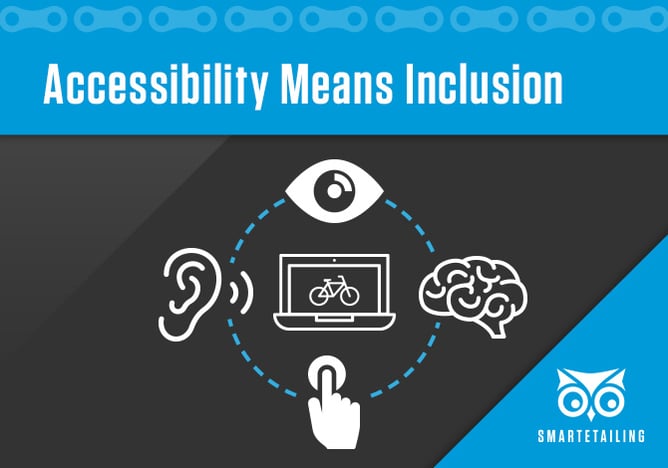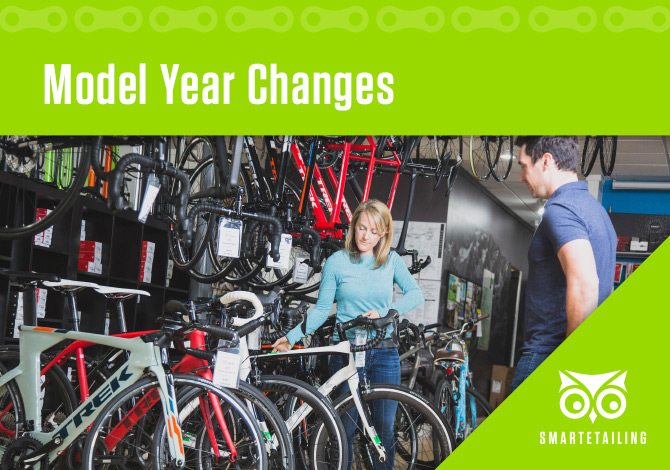Accessibility Means Inclusion

It is more important than ever that bike shop owners set aside time to better understand accessibility for their websites.
First and foremost, as the bike industry aspires to be more inclusive to a broader demographic - being accessible to people with disabilities is a key component.
Closer to your pocketbook, the number of ADA related legal actions taken against businesses that have an online presence is on the rise.
Bike shops are a likely target for opportunistic lawyers seeking to scare small businesses and extract settlements for non-substantive accessibility claims.
Bike shop success has been headline news in recent months, and that may attract attention from people who seek to capitalize on your success through unfortunate means.
How ADA applies to your website
The 1990 Americans with Disabilities Act (ADA) prohibits discrimination against individuals with disabilities in all areas of public life. The purpose of the law is to make sure that people with disabilities have the same rights and opportunities as everyone else.
Although the ADA does not explicitly mention websites (the first “web page” wasn’t published until 1991), it is increasingly being interpreted to include websites as “places of public accommodation” and therefore covered under the act.
While the law related to business websites is not settled, it is clear that businesses are expected to make website content and navigation accessible for people with disabilities, affording every visitor with “full and equal” use. Discrimination does not have to be intentional. Rather, if a lack of accessibility occurs, the business owner will face liability.
There are no enforceable ADA legal standards to follow for website accessibility. However, the absence of a straightforward set of legal requirements for website accessibility does not mean that a business will not be presented with a lawsuit.
Without clear legal standards, businesses like SmartEtailing look to the Web Content Accessibility Guidelines (WCAG) published by the World Wide Web Consortium - which generally sets out the elements necessary for a website to be accessible for people with disabilities.
Accessibility is more than compliance
The purpose of the ADA is to bring persons with disabilities into the economy — not to harm the businesses they would go to in the first place. One of the most tragic side effects of the rising number of ADA related “drive-by lawsuits” is that they violate the spirit of the ADA by pitting the disability and business communities against each other.
Creating this tension is truly a shame. One in four American adults – 61 million people – have a disability that impacts major life activities. These are people with rich lives who face challenges with daily life.
Many within the disabled community turn to bicycles as an alternative to cars, which many will never drive. Or they appreciate the same pure joy that attracted most bike shop owners to cycling themselves.
The bike industry is making every effort to open itself up to everyone who wants to enjoy a bicycle. The concept of inclusion regrettably often overlooks the disabled community.
Inclusion is about accepting and welcoming people for who they are. I’ve never met a bike shop owner who wouldn’t go out of their way to offer personalized assistance to anyone in need.
I'm confident that at SmartEtailing we share the same commitment to inclusion for people with disabilities. I’m proud of the work our team has done to make bike shop websites accessible - our company rallies around a vision of making bike shops a place for everyone.
Legal actions on the rise during COVID
Despite the positive outcomes aspired to in the ADA, not everyone plays a productive role in honoring the spirit of the legislation.
There has been a disturbing rise in drive-by lawsuits in which an individual enters a place of business not looking to shop -- but to shakedown. These lawyers target mom-and-pop businesses searching for any sign of noncompliance with ADA standards. Even the most minor, and often unintended, infractions are grounds for a lawsuit in their eyes.
Your physical bike shop has been vulnerable to these predatory actions for 30 years. Now, as your customers shift their shopping to online, so apparently are the legal predators.
COVID-19 has dramatically shifted more commerce online. With so many websites growing in prominence there will likely be an increase in the number of predatory litigants examining websites for shortcomings, and as Law.com puts it, “preparing a corresponding demand letter or lawsuit asserting a digital accessibility violation.”
California businesses are particularly vulnerable because in addition to the ADA, they also operate under requirements of the Unruh Civil Rights Act, a piece of California legislation.
A California defendant in an Unruh Act case faces minimum statutory damages of $4,000 for each violation, and pays the plaintiff’s attorneys’ fees if it loses at trial. These statutory damages and attorneys’ fees provisions have created a cottage industry of law firms that focus their practices on website accessibility claims.
As a result of the damages claimed under Unruh Act, California accounts for 42% of all ADA litigation nationwide.
What have we done to help
SmartEtailing has gone to great lengths to make our software platform as compliant as possible to the Web Content Accessibility Guidelines. Websites built on our platform routinely rank very favorably - often surpassing national retailer websites.
We undertook a broad accessibility initiative in 2019 following a Bicycle Retailer and Industry News article about Haro Bicycle facing a class-action lawsuit for website accessibility. This article raised concerns among our clients and our leadership about the degree to which we could minimize risk for bike shops.
In the last year, we’ve taken the following steps regarding website accessibility:
- Conducted a thorough accessibility audit of our platform
- Invested over 100 hours of development resources to enhancing accessibility
- Reviewed cycling catalog to resolve product content accessibility issues
- Trained Client Success, Marketing, and Content staff on website accessibility
- Performed over 300 individual site audits and resolved issues
- Added “Accessibility maintenance” to our managed services menu
- Created a help center article to assist clients in ongoing maintenance
- Published a blog post on informing clients about ADA and websites
Recent demand letters in California
You may be aware that a number of California bicycle retailers, some but not all using SmartEtailing, recently received demand letters from a law firm seeking settlement.
A demand letter is not a lawsuit. It is a preliminary tactic used in an attempt to induce someone to take action, usually in the form of a payment. Although most demand letters use hyperbolic language intended to alarm recipients and motivate response (by threatening a lawsuit), this does not necessarily mean a suit will be filed.
Upon learning of these predatory practices used against bike shops in California, we redoubled our efforts to further minimize risk for our clients. We promptly resolved some minor accessibility errors generated by a free online accessibility tool and sought to offer extra assistance to our clients who were impacted or likely to be impacted.
Further, we are also performing proactive audits whenever possible in an attempt to reduce the likelihood that the free online tools used by this particular firm sending form letters to retailers are less attractive targets for predatory legal action.
In addition to our internal work, we have engaged an expert consultant to conduct a thorough review of our software to identify potential enhancements that improve accessibility. We are also researching third party software applications that can be added to your website for an additional layer of protection.
Unfortunately, despite our best efforts, we cannot entirely eliminate all risk or control what opportunistic lawyers do, but we are confident that the underlying work we have invested in our software has minimized your risk.
We understand the importance of accessibility and will continue to invest in enhancements. We will make our best effort to communicate with you clearly so you understand accessibility.
What you should do
As an independent business subscribing to a software as a service (SAAS) platform, it is important that you and any staff that maintain your website understand the fundamentals of accessibility.
We invite you to review the resources we provide to properly maintain your website in compliance with guidelines.
https://www.smartetailing.com/help/website-ada-compliance
We recommend that you read what SmartEtailing has provided on the topic, and do your own research into how to navigate the gray area of what ADA compliance for a website means.
With your best effort and ours, your business’ risk can be minimized.
If your business does become a target of one of these opportunistic attorneys, please contact support@smartetailing.com for immediate assistance. We have worked very proactively with any client who has been threatened and we will do everything we can for you as well.
SmartEtailing isn't like other software companies - we have a one-on-one relationship with each client and have a sincere desire to be partners in your long term success.
You May Also Like
These Related Stories

3 Ways to Improve Your Online Business

Turn Browsers Into Buyers

.png?width=1676&height=300&name=WS_Logo_full_blue%20(1).png)
Comments (2)